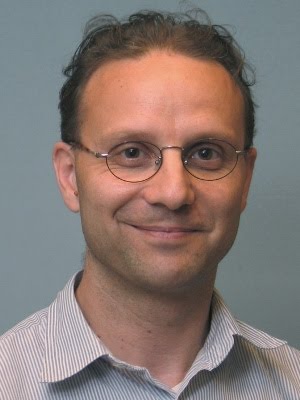Go to
Edoardo Charbon
Position statement:
Do we need to understand Quantum Mechanics, fully?
Quantum Mechanics is at the core of electronics but we don’t see quantum effects in everyday life and, until recently, we could happily design integrated circuits without fully understanding Quantum Mechanics. Now, the game has changed and quantum effects are becoming the norm, and we need to take them into account even when we design anything as simple as a transistor. An example is the tunneling transistor that may become the main building block of sub-10nm CMOS ICs. But quantum devices have been with us for some time. An example is the single-photon avalanche diode, a component that can detect and count photons at high speeds and with picosecond accuracies.
Imaging at single-photon resolution is the basis of a number of scientific applications, such as LIDARs, Raman spectroscopy, fluorescence lifetime imaging, and super-resolution microscopy (that earned Stefan Hell his 2014 Nobel Prize in chemistry), just to name a few. But this technology is now found in mainstream consumer electronics, such as 3D cameras, DIY telemeters, surgical endoscopes, PET scanners, and even smartphones. Why is that? Because it is CMOS compatible and simply superior in performance thanks to the fundamental nature of quantum mechanics.
Quantum Mechanics falling in our everyday life seems to be a general trend, possibly a great opportunity for us to size, perhaps the only way forward for microelectronics as a whole.
About the panel member:
 Edoardo Charbon received the Diploma from ETH Zürich in 1988, the M.S. from UCSD in 1991, and the Ph.D. from UC-Berkeley in 1995, all in Electrical Engineering. From 1995 to 2000, he was with Cadence Design Systems, where he was responsible for analog and mixed-signal design automation tools and the architect of the company’s initiative for electronic IP protection. In 2000, he joined Canesta Inc. as its Chief Architect, leading the development of wireless 3D CMOS image sensors. Since November 2002, he has been a member of the Faculty of EPFL, working in the field of CMOS sensors, biophotonics, and ultra low-power wireless embedded systems.
Edoardo Charbon received the Diploma from ETH Zürich in 1988, the M.S. from UCSD in 1991, and the Ph.D. from UC-Berkeley in 1995, all in Electrical Engineering. From 1995 to 2000, he was with Cadence Design Systems, where he was responsible for analog and mixed-signal design automation tools and the architect of the company’s initiative for electronic IP protection. In 2000, he joined Canesta Inc. as its Chief Architect, leading the development of wireless 3D CMOS image sensors. Since November 2002, he has been a member of the Faculty of EPFL, working in the field of CMOS sensors, biophotonics, and ultra low-power wireless embedded systems.
Since 2008 Prof. Charbon is Full Professor and Chair of VLSI design at TU Delft, succeeding Prof. Patrick Dewilde. At Delft he leads research in high performance, low power circuits and systems.
Prof. Charbon has consulted for numerous organizations, including Texas Instruments, Hewlett-Packard, and the Carlyle Group. He has published over 150 articles in technical journals and conference proceedings and two books, and he holds 12 patents. His research interests include high-performance imaging, quantum integrated circuits, and design automation algorithms.
Dr. Charbon has served as Guest Editor of the Transactions on Computer-Aided Design of Integrated Circuits and Systems and the Journal of Solid-State Circuits and is currently the chair of technical committees in ESSCIRC, ICECS, and VLSI-SOC.
Secondary navigation
- EPFL Workshop on Logic Synthesis and Emerging Technologies
- Luca Amaru
- Luca Benini
- Giovanni De Micheli
- Srini Devadas
- Antun Domic
- Rolf Drechsler
- Pierre-Emmanuel Gaillardon
- Jie-Hong Roland Jiang
- Akash Kumar
- Shahar Kvatinsky
- Yusuf Leblebici
- Shin-ichi Minato
- Alan Mishchenko
- Vijaykrishnan Narayanan
- Ian O'Connor
- Andre Inacio Reis
- Martin Roetteler
- Julien Ryckaert
- Mathias Soeken
- Christof Teuscher
- Zhiru Zhang
- Symposium on Emerging Trends in Computing
- Layout synthesis: A golden DA topic
- EPFL Workshop on Logic Synthesis & Verification
- Luca Amaru
- Luca Benini
- Robert Brayton
- Maciej Ciesielski
- Valentina Ciriani
- Jovanka Ciric-Vujkovic
- Jason Cong
- Jordi Cortadella
- Giovanni De Micheli
- Antun Domic
- Rolf Drechsler
- Henri Fraisse
- Paolo Ienne
- Viktor Kuncak
- Enrico Macii
- Igor Markov
- Steven M. Nowick
- Tsutomu Sasao
- Alena Simalatsar
- Leon Stok
- Dirk Stroobandt
- Tiziano Villa
- Symposium on Emerging Trends in Electronics
- Raul Camposano
- Anantha Chandrakasan
- Jo De Boeck
- Gerhard Fettweis
- Steve Furber
- Philippe Magarshack
- Takayasu Sakurai
- Alberto Sangiovanni-Vincentelli
- Ken Shepard
- VENUE
- Panel on Circuits in Emerging Nanotechnologies
- Panel on Emerging Methods of Computing
- Panel on The Role of Universities in the Emerging ICT World
- Panel on Design Challenges Ahead
- Panel on Alternative Use of Silicon
- Nano-Bio Technologies for Lab-on-Chip
- Functionality-Enhanced Devices Workshop
- More Moore: Designing Ultra-Complex System-on-Chips
- Design Technologies for a New Era
- Nanotechnology for Health
- Secure Systems Design
- Surface Treatments and Biochip Sensors
- Security/Privacy of IMDs
- Nanosystem Design and Variability
- Past Events Archive
